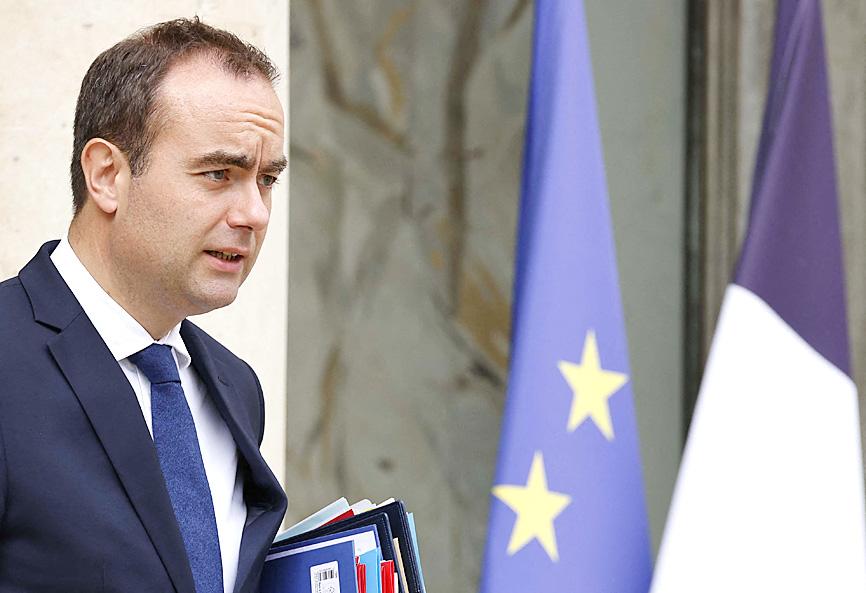French Minister of the Armed Forces Sebastien Lecornu on Wednesday appeared to rebuff China’s claims of sovereignty over the Taiwan Strait in telling the French Senate that Paris would ensure freedom of navigation in the region.
Lecornu made the remark after French Senator Olivier Cadic brought up security in the Indo-Pacific region during a question-and-answer session.
Cadic said that prior to his visit to Taipei last year with French Senator Alain Richard, who heads the Taiwan Friendship Group, 56 Chinese military aircraft had entered Taiwan’s air defense identification zone.

Photo: AFP
Taipei continues to be harassed by Beijing, which has sent 55 percent more military aircraft toward Taiwan so far this year compared with the same period last year, he said.
In addition, Chinese and Russian warships sailed past waters near Japan on July 4, he said, adding that French Navy Chief of Staff Pierre Vandier had said that China is threatening more countries around the South China Sea more frequently.
“The militarization and polarization in the Indo-Pacific region are unfortunate facts, and France should respond to them,” he said, asking the minister about how to enhance the country’s military presence in the region.
He then asked Lecornu about Taiwan issues, given that China last month claimed ownership of the Taiwan Strait as the French Senate is next week to welcome Legislative Speaker You Si-kun (游錫堃).
“Regarding the measures France takes to ensure the freedom of navigation in the Taiwan Strait, what can we tell the speaker?” he asked.
Lecornu said that France would protect that freedom.
“Diplomatically, it is France’s stance that Taiwan and China should keep communicating. Militarily, without a doubt, France would ensure the freedom of navigation protected by international laws,” he said.
He said that the patrolling missions in international waters are part of the efforts to ensure that freedom, adding that sending nuclear-powered submarines to patrol the South China Sea would “urge other countries to follow the international law of the sea.”
The Chinese Ministry of Foreign Affairs on Wednesday last week said that the Taiwan Strait was not international waters and that China has “sovereign rights and jurisdiction” over it.
The US Department of State issued a statement on Saturday last week saying that “the Taiwan Strait is an international waterway.”
Although Lecornu did not mention the Strait specifically, his statement made France the first European country to support Taiwan on the issue and reiterate the importance of the freedom of navigation.

ENDEAVOR MANTA: The ship is programmed to automatically return to its designated home port and would self-destruct if seized by another party The Endeavor Manta, Taiwan’s first military-specification uncrewed surface vehicle (USV) tailor-made to operate in the Taiwan Strait in a bid to bolster the nation’s asymmetric combat capabilities made its first appearance at Kaohsiung’s Singda Harbor yesterday. Taking inspiration from Ukraine’s navy, which is using USVs to force Russia’s Black Sea fleet to take shelter within its own ports, CSBC Taiwan (台灣國際造船) established a research and development unit on USVs last year, CSBC chairman Huang Cheng-hung (黃正弘) said. With the exception of the satellite guidance system and the outboard motors — which were purchased from foreign companies that were not affiliated with Chinese-funded

PERMIT REVOKED: The influencer at a news conference said the National Immigration Agency was infringing on human rights and persecuting Chinese spouses Chinese influencer “Yaya in Taiwan” (亞亞在台灣) yesterday evening voluntarily left Taiwan, despite saying yesterday morning that she had “no intention” of leaving after her residence permit was revoked over her comments on Taiwan being “unified” with China by military force. The Ministry of the Interior yesterday had said that it could forcibly deport the influencer at midnight, but was considering taking a more flexible approach and beginning procedures this morning. The influencer, whose given name is Liu Zhenya (劉振亞), departed on a 8:45pm flight from Taipei International Airport (Songshan airport) to Fuzhou, China. Liu held a news conference at the airport at 7pm,

GRIDLOCK: The National Fire Agency’s Special Search and Rescue team is on standby to travel to the countries to help out with the rescue effort A powerful earthquake rocked Myanmar and neighboring Thailand yesterday, killing at least three people in Bangkok and burying dozens when a high-rise building under construction collapsed. Footage shared on social media from Myanmar’s second-largest city showed widespread destruction, raising fears that many were trapped under the rubble or killed. The magnitude 7.7 earthquake, with an epicenter near Mandalay in Myanmar, struck at midday and was followed by a strong magnitude 6.4 aftershock. The extent of death, injury and destruction — especially in Myanmar, which is embroiled in a civil war and where information is tightly controlled at the best of times —

Taiwan was ranked the fourth-safest country in the world with a score of 82.9, trailing only Andorra, the United Arab Emirates and Qatar in Numbeo’s Safety Index by Country report. Taiwan’s score improved by 0.1 points compared with last year’s mid-year report, which had Taiwan fourth with a score of 82.8. However, both scores were lower than in last year’s first review, when Taiwan scored 83.3, and are a long way from when Taiwan was named the second-safest country in the world in 2021, scoring 84.8. Taiwan ranked higher than Singapore in ninth with a score of 77.4 and Japan in 10th with